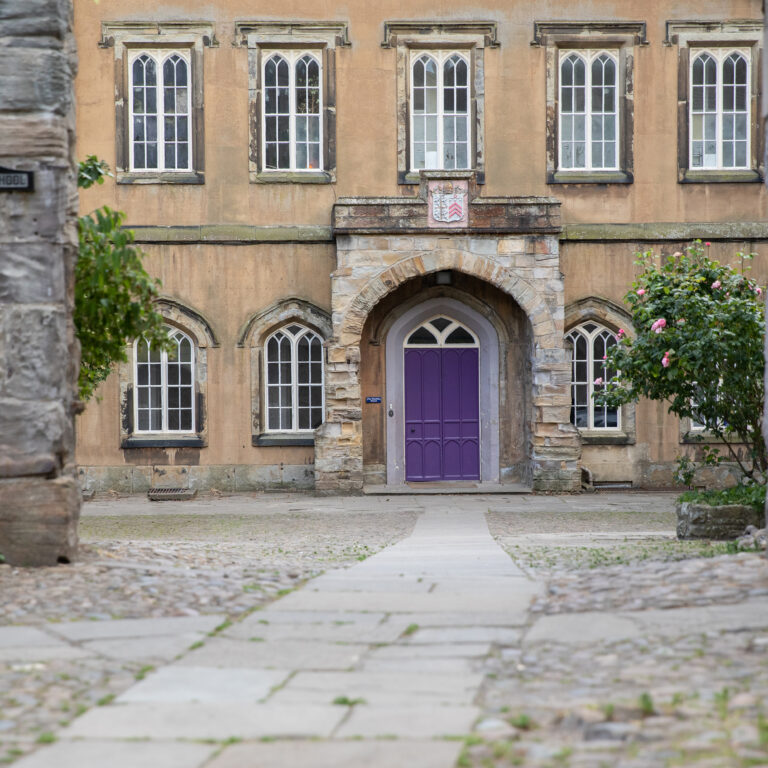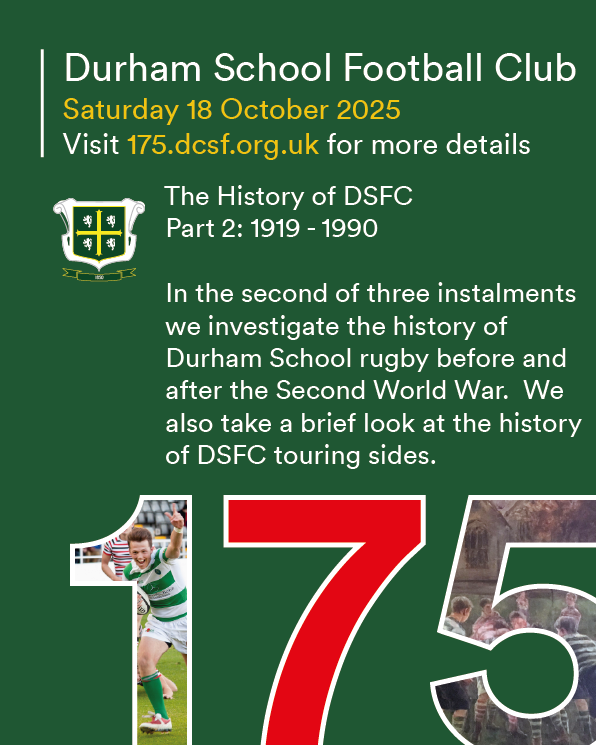
175 Years of the Development of Rugby at Durham School
As we approach our 175th Anniversary Celebrations on Saturday 18 October 2025, Development Director Andrew Beales and Archivist George Gardner take a look back across Durham School Football Club’s long history. DSFC is one of the world’s oldest rugby clubs. In part two, we look at how DSFC influenced Rugby between the Wars, the legendary Mike Weston OD, and how touring developed from humble beginnings, to the international travel our pupils enjoy today.
Between the Wars
Despite the tragedies of the First World War, the game soon revived in the interwar years. Robert Henderson, at Durham from 1912 to 1918 and a member of the 1st XV in 1916-18, was capped twice for Scotland. In 1924 he joined the British and Irish Lions on their South African tour, though injury soon forced his retirement. Barry Cumberlege, a pre-war star who survived active service in both WWI and WWII, was described in the early 1920s in the press as “by far the best full back England had had since the war”. He then became an international referee, taking charge of sixteen Test matches between 1926 and 1934.
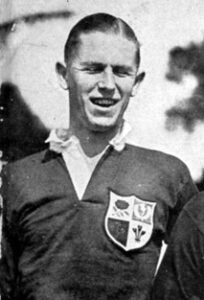
Sir Carl Aarvold, at Durham from 1920 to 1925 and 1st XV captain in his final year, achieved four successive Varsity Match victories with Cambridge, a feat that has never been surpassed. He won a Grand Slam with England in 1928, and later captained the British and Irish Lions. Off the pitch, his distinguished legal career culminated in service as Recorder of London. Fellow OD, and contemporary of Aarvold, Robert Smeddle scored a hat trick in the 1928 Varsity Match, and turned out for the Barbarians and England. John Garbutt Askew, another Cambridge Blue, won three England caps in the 1930 Five Nations.
John Brett, scored seven of the twenty-three points in the British Lions test in Argentina in 1936, before captaining Cambridge in 1937. Brett was wounded in Normandy in 1944 and later returned to Durham as Headmaster from 1958 to 1967, where he inspired the next generation of Durham School sportsmen.
Bow School formed a vital parallel stream in this story. Vivian Davies, an Old Bowite and nephew of Bow Headmaster George Shafto Legard, captained the Bow 1st XV and later Marlborough College 1st XV, then represented England in the 1920s. He died on active service during the Second World War. The most powerful expression of the Bow Durham partnership came with Charles Lodge Adamson’s headmastership of Bow from 1961 to 1976. Adamson’s insistence on discipline and skills shaped generations of players, none more influential than Michael Philip Weston, who repeatedly credited Adamson with forming his rugby career.
The Golden Age of Amateur Rugby
The post-war amateur era saw Durham and Bow at the heart of English rugby.
John Phillips (S, 1960-65) played for Northumberland and Durham Counties as well as captaining the famous Northern club side. Michael George Nicholson (P, 1962-67) played for Durham City 1st XV from 1969-84 and represented East Yorkshire.
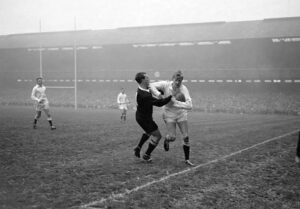
Mike Weston (C, 1952-56), educated at Bow and Durham, won twenty-nine England caps. Between 1960 and 1968, he captained his country five times, led England in all three tests on the 1963 tour of Australasia, and again in the final two matches of his international career in 1968. He toured with the British Lions in 1962 and 1966 and represented Durham County through a period of repeated Northern Championship success. He later served as an England selector and then team manager at the first Rugby World Cup in 1987.
John Matthew Ranson (P, 1951-57), a contemporary of Weston, won eleven England caps, scoring on debut against New Zealand in Auckland and again against Wales.
Michael “Max” Miller (s, 1965-70) represented England Schools in 1969/70 in his final year on Durham School’s 1st XV.
John Croasdell (S, 1965-71) had a strong schoolboy career representing Durham County U19 (1969-71), going on to play for Loughborough Colleges 1st XV (1971-75), England Universities XV (1972-5) and Leicester XV (1973). He twice represented England U23 and played regularly for Lancashire County. John played club rugby as part of the Fylde RFC pack alongside England Captain Sir Bill Beaumont. It was here that he gained the nickname ‘the Crusher’. While playing for Fylde, he taught at Arnold School and then went on to be Director of Sport at RGS Worcester. John typified the contribution ODs made to the golden years of amateur rugby, not only playing at a high level, but also having a parallel career in teaching and coaching.
Brothers David (S, 1966-71) and John (S, 1962-65) Hall both played for the 1st XV. John would go on to to play for the Northumberland County XV in 1971, and the North East Counties vs New Zealand in 1972; David, meanwhile, played for Cheltenham RFC 1st XV until 1986. They used their sporting experience and business acumen to create Gulliver’s Sports Travel, the UK’s leading sports tour operator.
C. Mike Saint (P, 1966-71) represented Northumberland Colts in 1972 before moving into refereeing and administration. He served as Secretary to the Cumbria Rugby Union Referees’ Society from 1991 to 1996 and was a member of the Northern Counties Rugby Committee during that time. From 1992 to 1998 he was appointed to the RFU Touch Judge Panel, culminating in his appointment as Touch Judge for the England v Scotland U19 international in 1997.
Jonathan Westbury (P&L, 1966-71) headed to Dundee University, where he continued his rugby career, going on to captain both the University and the U23 Midland District (Scottish Equivalent of a Rugby County). Graham Armstrong (S, 1967-70) played for Durham City (1975-86) and then down in Cheshire at Sandbach between 1987-89. He played at Durham City alongside Jon Bland (P,1972-78), whose first Durham City game was in 1978, while still at school.
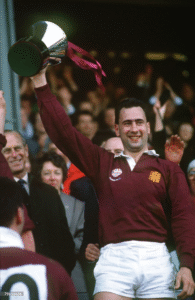
Jon went on to have an incredible career at the end of the amateur era. A stalwart at Durham City, captaining the side for many years, Jon was also an England Colt, won numerous County caps and most notably captained the County in their County Championship victory against Cornwall at Twickenham in 1989. Jon went on to coach Chorister School rugby for over 25 years, including their record-breaking 1st XV in 2005.
Coaching and leadership have been consistent themes. John Kingston (L, 1971-79), a 1st XV captain, schoolboy international and three-time Varsity player (captaining Cambridge in 1982), moved into coaching after injury curtailed his playing career. He guided Richmond from the third division to the Premiership, then joined Harlequins in 2001, becoming Head Coach in 2008 and Director of Rugby in 2016. Under his tenure, Harlequins won the English Premiership title in 2012, two European Challenge Cups in 2004 and 2011, and the LV Cup in 2013.
Other notable names from this period include R.S. Tilly, who played for both the North East Counties and an England XV against Australia in 1973-74. PD Marshall who represented England Schools against New Zealand in 1985, John Dent, who made numerous England Schools apparencies in 1986-87, JC Belton also played for England Schools in 1990 and played alongside LA Davidson in an England Schools President’s XV vs Italy in 1988.
Tours and TV!
Whereas traveling to fixtures like Giggleswick in North Yorkshire was once an adventure worthy of recording (there is film footage of the 1926 game at Giggleswick for example), as travel became easier, the sports tour became a feature of Durham School rugby.
In 1965 the first official tour for the “rugger” was organised not to foreign shores but to the Midlands – during the Christmas holidays a team from School ventured to play Stowe (3-3), Bablake (Lost 0-18) and Northampton Grammat School (Lost 5-35). The tour was only made possible by loaning a minibus from Bede College! In the same year, ITV covered the OD vs School match live on TV. Despite the absence of the England duo of Ranson and Weston from the ODs they managed to hold on to a narrow 6-3 victory.
10 years later, in 1975, the 125th Anniversary of DCSF was celebrated with ITV again showing the match live from the playground. This time, an OD and School team took on the Dolphins touring side. While the School side lost 39-25, Norman Bolam, the then school captain, scored 17 of the School’s 25 points. The dinner at Hatfield College later that day had 130 guests, including the president of the RFU – G Tarn Bainbridge.
In 1976 there was a tour to British Columbia, followed in 1977 to the equally exotic Isle of Wight. In 1978 an OD tour was mustered and played three games in Holland. In 1979 the 1st XV went to Spain and Portugal – winning all their matches and the Sagres Cup. 1980 again saw the Rugby side flying over the Atlantic and playing in the USA for the first time. Many of these tours relied on billeting with families from the opposing school teams. A fabulous tradition that has sadly been lost.
In 1981/2 the 1st XV toured Hong Kong for the first time, beating all they encountered including the Junior Hong Kong National Side. 1983/4 saw a trip to Australia, and in 1986/7, the DSFC went on tour to Canada, and again the trip was filmed – this time by camcorders – and a video was produced.
Towards the end of the decade, Nick Willings organised a World School Rugby Festival in Durham, where four English teams took on opposition from Zimbabwe, France, Portugal, Scotland, Ireland and Wales.
South Africa was added to the roster of tour destinations in 1992/1993 and has remained popular ever since. 1994 saw the first Bow World Tour for their 1st XV and the 1995 Dunelmian reports on the previous year’s exploits in Argentina and Chile.
In 1999-2000, DSFC were again on tour to Australia, this time to mark the 150th anniversary of the Rugby Club and to take part in the World Schoolboy 10s – where the side won the Bowl Competition. This was good preparation for a side that would next year find itself in the Finals of the Daily Mail Cup at Twickenham. 2000 also saw the 150th Anniversary of DSFC at the Ramside, with 270 guests present. The next day, many more saw the School take on and beat Barnard Castle on the playground.
2003 saw a return to Australia for a four-week tour. A further appearance in the Daily Mail Cup final in 2006 was followed by the Australia Tour that summer. The boys again went down under in 2010 with four of the five senior fixtures won. The USA and Canada then featured again in the 2010s.
The economic cost of trips and tours has been an increasing concern, so tours have often become multiple-team affairs with rowing, hockey, and netball players also making up part of the touring party. That said, the Isle of Wight has not featured much in recent years, with South Africa and Australia remaining popular destinations for these incredible development opportunities for our young players.
Next Time
In our concluding part of the History of Durham School Rugby we look at how ODs have risen to the very top of the RFU, and how the professionalisation of the game has given many ODs career opportunities in the North East and around the world. We also talk about the “magic of the cup” and perhaps most importantly of all, we look to the future. There are pupils in FS1 today who will be 30 at the 200th anniversary of DSFC – we can only speculate as to what part they will play in the club’s future.
Whenever we attempt to trace some history at Durham School, we do so with the knowledge that it is impossible to capture every name, every event, and every contribution. That is sadly part and parcel of being a centuries-old institution. Inevitably, some details will be overlooked and some individuals not mentioned, but this should never be taken as a dismissal of their part. This is as true for rugby as it might be for music, drama, rowing or cricket, so we apologise if someone is missed. Please do contact od@dcsf.org.uk with your questions and suggestions.
